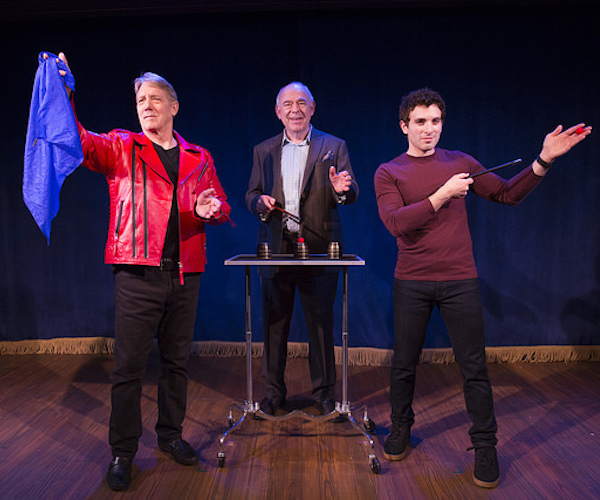Fuse Theater Review: “Presto Change-O” — Magic With a Punch
This character-driven comedy about three generations of illusionists is light as a bauble, yet packs a subtle psychological punch.
Presto Change-O, book and lyrics by Eric Price, music by Joel Waggoner. Directed by Marc Bruni. Barrington Stage Company’s Musical Theatre Lab, St. Germain Stage, 6 Linden Street, Pittsfield, MA, through June 11.

Michael Rupert, Lenny Wolpe, and Jarrod Spector in the Barrington Stage production of “Presto Change-O.” Photo: Scott Barrow.
By Helen Epstein
What a brilliant idea for a musical, I thought as I watched Presto Change-O, the beguiling premiere commission of Barrington Stage’s Musical Theatre Lab, now kicking off the summer season at the intimate St. Germain Stage. A character-driven comedy about three generations of illusionists, Presto Change-O is light as a bauble, yet packs a subtle psychological punch.
A small red ball floats in the darkness during the pre-recorded overture, then disappears, only to reappear at key moments. As the play opens, the red ball is in the hands of Sheldon, the elderly patriarch of the dynasty, as he demonstrates what he calls the oldest magic trick in the world: “The Cups and the Balls.”
Kind, senile Sheldon is the father of Mary, ex-wife of Lance and mother of Michael. All four are theater magicians: Sheldon specializes in old-fashioned sleight-of-hand tricks; flashy, middle-aged Lance, in rock star illusions; young Michael in seemingly true tests of endurance. Mary, now a real estate agent, was previously her father’s and then her ex-husband’s stage assistant. Lance’s current assistant/cleaning lady Tina, and his brother Arthur round out this off-beat cast of characters.
Eric Price, who wrote the book and lyrics, has managed to knit their lives into a satisfyingly realistic story, with echoes of myth and fairy-tale, as well as instances of magic. Objects may levitate mysteriously and without warning; fathers and sons lock horns in age-old generational conflict.
Most of the action is anchored in the wood-paneled living room of Lance’s Manhattan townhouse, a pleasantly sumptuous set by Derek McClane, decorated with posters of legendary magicians. The costumes by Alejo Vietti struck me as particularly apt, adding to the characterization of the dramatist personae.
And what an ensemble of actors! Lenny Wolpe as Sheldon, Michael Rupert as Lance, and Jarrod Spector as Michael are all excellent, multi-talented performers, singing a difficult score, performing magic tricks, and portraying men in different stages of life. Wolpe steals several scenes as the wise grandfather who has had a stroke; Rupert makes a nuanced father out of a character who might otherwise be just a sleazy creep; Spector brings an intelligence and grace to the role of the young and angry son. Bob Walton provides welcome comic relief as the travel agent with an idea for them.
The women, too, bring significant singing and acting chops to their roles. Barbara Walsh is excellent as the middle-aged Mary, sandwiched between having to care for her elderly father and troubled son, and her ambivalence towards her ex-husband. Jenni Barber is a convincing Tina, the assistant who is aiming for a career as a magician herself. She, also, rises to the demands of an exacting score.
Which brings me to the music by composer Joel Waggoner. It says a lot for the power of this musical that I loved it despite the music. I left without a single musical phrase, let alone a song, having impressed itself on my mind. How can this happen in a musical with nearly 20 musical numbers that feels almost through-composed?
For one thing, the music is a pastiche of styles, with no one style predominant. The score is challenging to sing and to listen to. But, perhaps more importantly, the music didn’t rise to the level of the visual and dramatic material. With so much compelling stage business for the viewer to attend to, the music becomes more like a soundtrack to the drama rather than a focus of attention.
The illusions by Joseph Wartnerchaney are a source of reliable delight and amazement. Director Marc Bruni has kept the action clear, clean, and perfectly-paced.
Barrington Stage premiered William Finn and Rachel Sheinkin’s musical The 25th Annual Putnam County Spelling Bee, which later transferred to Broadway, and revived On the Town, which went to Broadway as well. I wouldn’t be surprised if this musical followed in their wake.
Helen Epstein is the author of eight books of non-fiction and co-publisher of Plunkett Lake Press in the Berkshires.

Really? You didn’t think “Tada “was memorable or whistle worthy? Couldn’t get it out of my head after the show. Also thought the theme song “Presto” was very moving. There were several others that brought tears to my eyes. “IDK,” went to my heart!